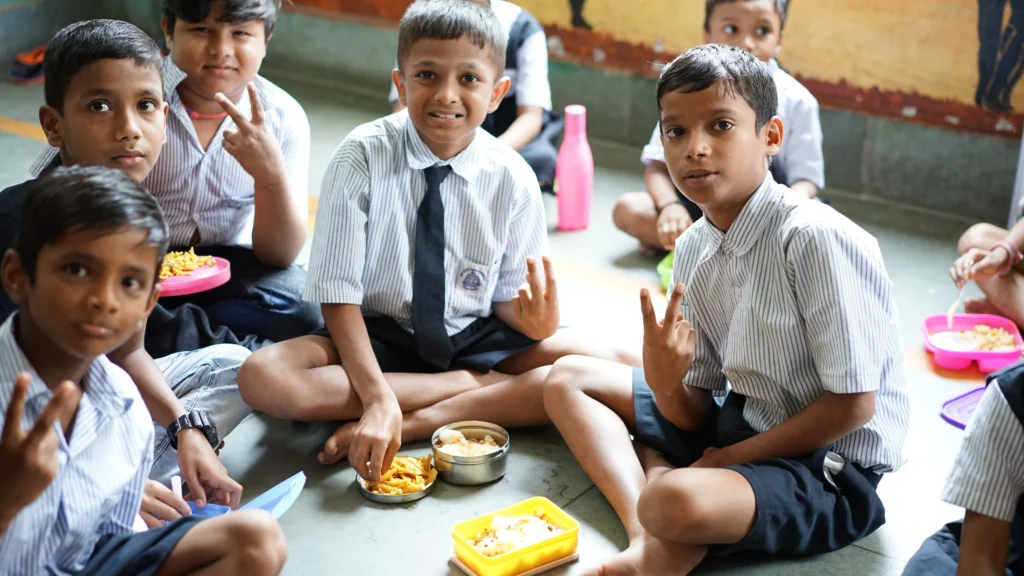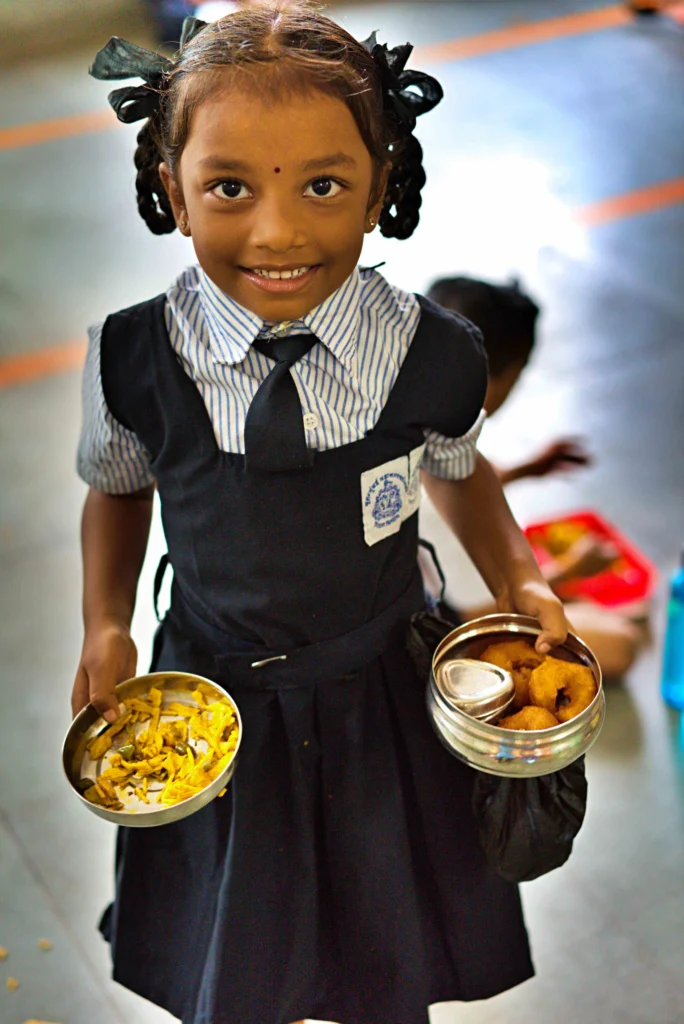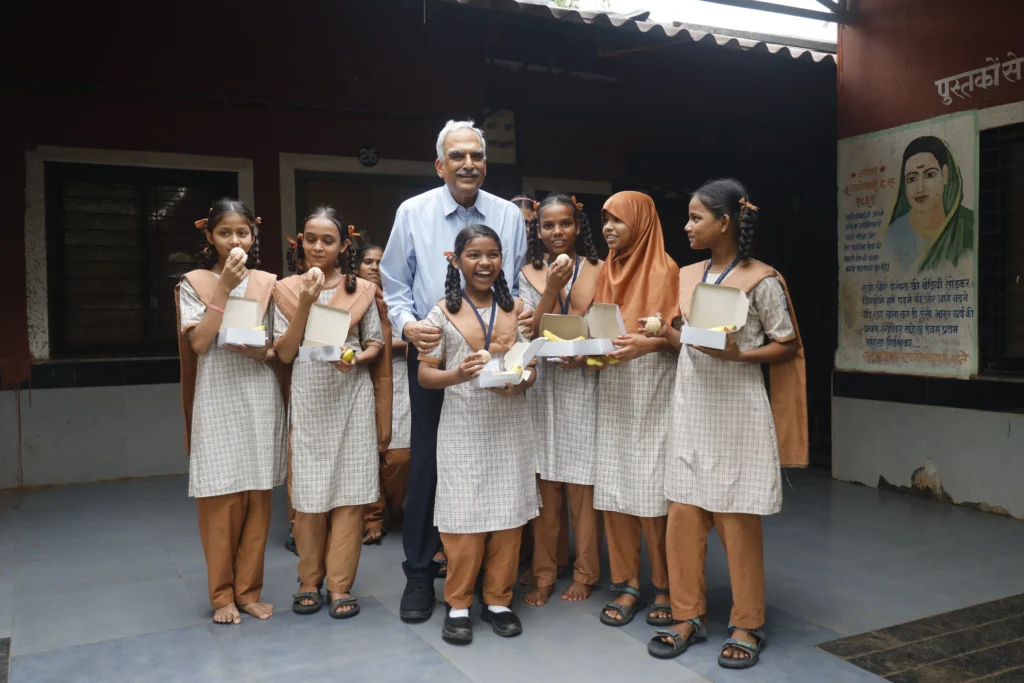India’s recent Global Hunger Index (GHI) 2024 score is 27.3, ranking it 105th out of 127 countries, indicating a “serious” hunger crisis fuelled by persistent issues with malnutrition and food insecurity. In this context, Mumbai Roti Bank has taken up the mission of providing wholesome meals to the needy, aiming to eradicate hunger and malnutrition and work towards a better future for them.
Mumbai Roti Bank, a non-profit hunger relief organization initiated by the Roti Foundation Mumbai, is committed to eliminating hunger and malnutrition. Established in December 2017 under the visionary mentorship of Mr. D. Sivanandhan, former Director General of Police, Maharashtra, the organization has made remarkable strides in addressing food insecurity.
With a mission to provide food security to the underprivileged, Mumbai Roti Bank has served over 18 million meals to date. In the past seven years, Mumbai Roti Bank has not only improved its operations to reach the neediest in Mumbai but has also extended its operations to Nagpur, Coimbatore, Hyderabad, Chennai, Ahmedabad, and Cuttack.
In a candid conversation with ‘The Times of Mumbai‘, Mr. Sivanandhan, Founder and Managing Trustee of Mumbai Roti Bank, reveals the inspiration behind the initiative, the challenges it faces, and his unwavering commitment to ensuring “no one should go hungry.” Here are the excerpts from the interview.
Q. What inspired you to start Mumbai Roti Bank, and how has the journey been since its foundation in 2017?
D. Sivanandhan: I’ve seen how hunger can push people to their limits and even lead them to engage in illegal activity. But if we can address their basic need for a nourishing meal, we might just provide them an opportunity to create a brighter future for themselves.
With a mission with a vision: “No one should go hungry!” We began collecting excess food from weddings, events, hotels, and housing societies and delivered it to those in need in slums and on the streets.

But then, COVID struck in 2020, bringing with it challenges in food collection and distribution. To tackle this, we set up our own kitchen and, with the help of our employees and vans, ensured proper hygiene and nutrition while distributing around 47,000 meals every day to those who were in need, across areas from Dharavi-Sion-Koliwada in Mumbai.
Initially, there were challenges such as collecting food from wedding venues, events, hotels, and housing societies and delivering it to thousands of hungry people who live in slums or footpath. But the problem with this food, it often did not constitute a full meal, and the food from hotels became stale. Feeding someone half and unhealthy food is not considered appropriate. To solve this problem, we started our kitchen to cook freshly cooked nutritious meals in January 2020. Additionally, fundraising was a significant problem. However, with determination, we overcame all these obstacles and found effective solutions.
D. Sivanandhan
Q. What measures does Roti Bank take to ensure food safety and timely delivery?
D. Sivanandhan: To deliver fresh, nutritious meals on time and improve the quality of the food served, we have a modern kitchen with 3 boilers, vegetable cutter and a roti making machine along with 12 vans and staff.
Q. How many meals does Roti Bank serve on average daily or monthly, and what areas do you primarily cover?
D. Sivanandhan: Currently, we are providing food to students in 30 schools and government hospitals across Mumbai, distributing 15,000 meals every day.
“With a vision to create a stronger and healthier Bharat, roti bank wants to focus on providing wholesome food to a maximum number of children and help them to build a better future” D. Sivanandhan

Q. How does the organization raise funds for its operations? Is it associated with the government for support?
D. Sivanandhan: No, we are not connected to any association. We are a totally independent NGO. We raise funds from corporations, other NGOs and individual donors. I thank all the donors for supporting us.
Q. How do you measure the impact of Roti Bank’s work in reducing hunger and malnutrition?
D. Sivanandhan: We have made significant progress and achieved remarkable results. To date, the Roti Bank has distributed 18 million meals across seven states in India.
Our efforts have started spreading positive change. By improving school attendance for underprivileged children and offering vital support to families in crisis, we are making a tangible difference in lives.
“I urge everyone not to waste food and instead actively participate in and contribute to social initiatives that address these pressing issues. Together, we can make a meaningful impact by ensuring surplus food reaches those in need rather than being wasted”, d sivanandhan
Q. How important is volunteer participation, and how do you encourage people to join your cause?
D. Sivanandhan: Volunteer participation is always appreciated. People are welcome to visit our distribution centres and help us in the food distribution. People can show us support on social media and through crowdfunding as well.
Q. How does technology help to make the operations more efficient?
D. Sivanandhan: We use technology to inform people about our work and connect them and spread awareness.
Q. What is the future goal of the organisation?
D. Sivanandhan: With a vision to create a stronger and healthier Bharat, the organization wants to focus on providing wholesome food to a maximum number of children and help them to build a better future.

Q. India has a “serious” hunger crisis, as indicated by the recent Global Hunger Index (GHI) 2024. In your opinion, what systemic changes are needed to address these issues?
D. Sivanandhan: The government and other Non-profit organizations are doing their best on their level to combat poverty and malnutrition. To address this issue, the government already provides free rations across India. In this context, global reports hold little relevance.
Q. Nowadays, the image of police is seen as negative as they demolished the home of the accused under govt. pressure. Being a Former DGP of Maharashtra, how do you feel about this?
D. Sivanandhan: Although there is a need of police reform, police perform a lot of good deeds, such as finding missing children and saving women trapped in prostitution and counselling, that go unnoticed. For example, recent elections conducted in Maharashtra went smoothly with the help of police however it went unnoticed.
Although there is a need of police reform, police perform a lot of good deeds, such as finding missing children and saving women trapped in prostitution and counselling, that go unnoticed. For example, recent elections conducted in Maharashtra went smoothly with the help of police however it went unnoticed.
Unfortunately, without a public relations office, these good deeds remain in the shadows, often taken for granted. Meanwhile, the media tends to highlight the negative aspects, boosting TRP ratings by focusing on controversy and crime.
Our positive statistics are being taken for granted, and the media mainly shows the negative aspects of boosting TRP. Since the British era, when the police tortured the populace, our reputation has suffered. So that public perception stays the same.
D. Sivanandhan
Q. The image of the police officer is often seen as a rough, emotionless individual. How does it feel to see yourself as a kind and empathetic person who understands the pain of others?
D. Sivanandhan: Police officers are not just enforcers of the law—they are human beings with families, hearts full of empathy, and a deep sense of duty to society. While many may perceive the role of the police solely through the lens of authority, it’s important to recognize the countless acts of kindness and service they perform quietly, without seeking recognition.

Apart from Mumbai Roti Bank, I also founded three schools in Thane, Gadchiroli, and Chandrapur, as well as thirty gymnasiums in Mumbai and a restaurant, Urjita.
Q. What message would you like to give to the citizens who may want to contribute to the cause of eradicating hunger?
D. Sivanandhan: According to a report, India wastes an incredible 68 million tons of food a year, ranking second only to China in this regard. In a country where millions struggle with hunger and malnutrition, this is a sharp contrast. It’s a reminder of the importance of valuing every bite.
I urge everyone not to waste food and instead actively participate in and contribute to social initiatives that address these pressing issues. Together, we can make a meaningful impact by ensuring surplus food reaches those in need rather than being wasted.


Very nice & informative article. It is true to say that duties performed by the police officials are part of their responsibility but this kind of initiative shows another facet of the Men in Khaki.
Also, D. Shivanandan sir is always ideal for many when he was in Khaki, but this task make him miles ahead and source of inspiration.
Thanks for sharing this Article
Sir, Helping the needy and people living below the poverty line in a meaningful and impactful way requires a combination of compassion, strategy, and sustainable efforts, which D Sivanandhan sir and his team have. Really one of the most benevolent work.
This is a great example of sharing & caring heads off to Roti Bank
Respected Ex DGP Mr D Sivanandhan is a Legend in his own riight!! I am a Fan !! And will stay so!!2
Respected sir,
Selfless and Nobel work.
many people think, but your ROTI BANK is actually executing it.
All the very best for your sustainable work sir……DIL-SE.